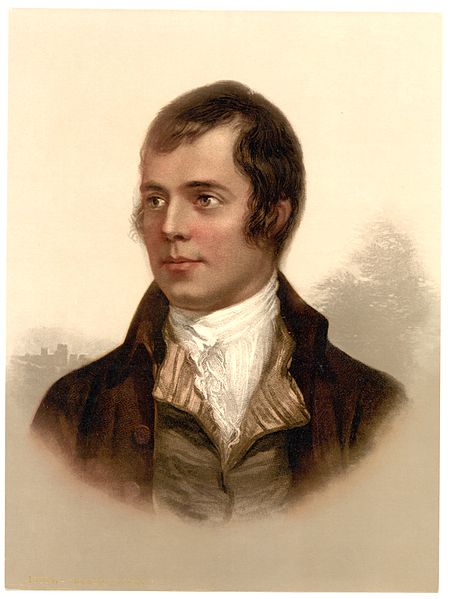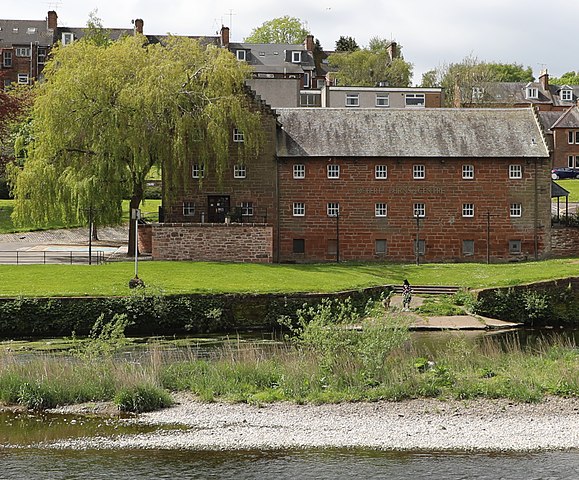
In the Western world at midnight on New Year’s Eve, a song, Auld Lang Syne, is traditionally sung to say goodbye to the old year.
The text is a Scots language poem written by Robert Burns in the 1700s, based on an older Scottish folk song with a traditional tune.
Auld Lang Syne is a Scots expression meaning long long ago, days gone by, times long past, once upon a time, or old times.
For auld lang syne, which is sung about in the tune, refers to for the sake of old times.
TU students interested in literature, folklore, sociology and related subjects might find it useful to note that the Thammasat University Library collection includes a number of books by and about Robert Burns.
Robert Burns is considered the national poet of Scotland.
Since readers of English as a second language may be challenged by Scots poems, it is helpful that some translators such as Michael R. Burch have posted their own versions in standard modern English of the poetry of Burns.
Here is a translation of Auld Lang Syne into modern English:
*
Should old acquaintance be forgot,
And never brought to mind?
Should old acquaintance be forgot,
And days for which we pine?
For times we shared, my darling,
Days passed, once yours and mine,
We’ll raise a cup of kindness yet,
To those fond-remembered times!
*
The song asks whether old friends should be forgotten, and the reply is that no, friends should not be forgotten.
Instead, friends should drink together and remember old times.
Robert Burns also wrote many poems and essays with progressive social ideas.
Some Scots activists even compare him symbolically to the Cuban revolutionary Che Guevara (see a poster below available on Wikimedia Commons).
The Guardian reported in 2018 that some readers today find Burns controversial because of his treatment of women, but still consider him worth reading.
Closer to his own time, Burns was very influential as a farmer who wrote poems.
Even in the north of England, where English was the common language, some working class people wrote poems in Scots as a tribute to him.
Here are a few more poems by Burns translated into modern English by Michael R. Burch and posted online:
*
A Red, Red Rose
Oh, my love is like a red, red rose
that’s newly sprung in June
and my love is like the melody
that’s sweetly played in tune.
And you’re so fair, my lovely lass,
and so deep in love am I,
that I will love you still, my dear,
till all the seas run dry.
Till all the seas run dry, my dear,
and the rocks melt with the sun!
And I will love you still, my dear,
while the sands of life shall run.
And fare you well, my only love!
And fare you well, awhile!
And I will come again, my love,
though it were ten thousand miles!
*

A poem known as To a Mouse may seem to be a comic theme.
Yet its full title makes clear that Burns as a farmer was concerned that by ploughing fields at his farm, he accidentally destroyed a mouse’s nest, which it needed to survive the harsh winter in Scotland.
To a Mouse, on Turning Her Up in Her Nest With the Plough, November, 1785, according to one account, was written by Burns when he was in the middle of ploughing a field:
*
To a Mouse, on Turning Her Up in Her Nest With the Plough, November, 1785
Sleek, tiny, timorous, cowering beast,
why’s such panic in your breast?
Why dash away, so quick, so rash,
in a frenzied flash
when I would be loath to run after you
with a murderous plowstaff!
I’m truly sorry Man’s dominion
has broken Nature’s social union,
and justifies that bad opinion
which makes you startle,
when I’m your poor, earth-born companion
and fellow mortal!
I have no doubt you sometimes thieve;
What of it, friend? You too must live!
A random corn-ear in a shock’s
a small behest; it-
‘ll give me a blessing to know such a loss;
I’ll never miss it!
Your tiny house lies in a ruin,
its fragile walls wind-rent and strewn!
Now nothing’s left to construct you a new one
of mosses green
since bleak December’s winds, ensuing,
blow fast and keen!
You saw your fields laid bare and waste
with weary winter closing fast,
and cozy here, beneath the blast,
you thought to dwell,
till crash! the cruel iron ploughshare passed
straight through your cell!
That flimsy heap of leaves and stubble
had cost you many a weary nibble!
Now you’re turned out, for all your trouble,
less house and hold,
to endure cold winter’s icy dribble
and hoarfrosts cold!
But mouse friend, you are not alone
in proving foresight may be vain:
the best-laid schemes of Mice and Men
go oft awry,
and leave us only grief and pain,
for promised joy!
Still, friend, you’re blessed compared with me!
Only present dangers make you flee:
But, ouch!, behind me I can see
grim prospects drear!
While forward-looking seers, we
humans guess and fear!
*
Attentive readers may note that the phrase in the poem about the best plans made by mice and people often go wrong, inspired a famous novel, Of Mice and Men, by the Nobel Prizewinning American author John Steinbeck.
The TU Library owns different editions in the original English and also Thai translation of Steinbeck’s novel.
Sweet Afton is another lyrical poem by Burns describing the Afton Water in Ayrshire, Scotland.
The River Afton or Afton Water is a small river in Ayrshire, a historic county in southwestern Scotland.
Here is the poems in a stndard modern English version, as posted online:
*
Sweet Afton
Flow gently, sweet Afton, among your green slopes!
Flow gently, I will sing you a song in your praise!
My Mary is asleep by the murmuring stream –
Flow gently, sweet Afton, disturb not her dream!
You stock dove whose echo resounds through the glen,
You wild whistling blackbirds in yonder thorny den
You green crested lapwing, your screaming forbear –
I charge you, disturb not my slumbering fair!
How lofty, sweet Afton, your neighbouring hills,
Far marked with the courses of clear, winding rills!
There daily I wander, as noon rises high,
My flocks and my Mary’s sweet cottage in my eye.
How pleasant thy banks and green valleys below,
Where wild in the woodlands the primrose blow:
There often, as mild evening weeps over the lea,
The sweet scented birch trees shades my Mary and me.
Your crystal stream, Afton, how lovely it glides,
And winds by the cottage where my Mary resides!
How sportive your waters her snowy feet wash,
As, gathering sweet flowerets, she stems thy clear wave!
Flow gently, sweet Afton, among your green slopes!
Flow gently, sweet river, the theme of my poem!
My Mary is asleep by your murmuring stream –
Flow gently, sweet Afton, disturb not her dream!
*
(All images courtesy of Wikimedia Commons)


